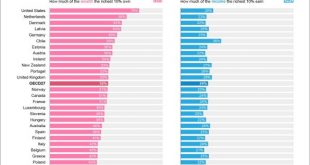Read More »
Wicked problems in economic policy
from Maria Alejandra Madi While the study of wicked problems is not new, there is a need to develop a broader understanding of its scope in policies under the paradigm of complexity. The origin of the term “wicked Problem” goes back to Rittel and Webber’s (1973) questioning of the validity of technical-scientific approaches in social policy and urban planning. In the face of complexity and uncertainty, these problems require iterative approaches, with the consideration of multiple causes...
Read More »Neoliberal globalization
from Ted Trainer and current RWER issue The conventional approach to development assumes that movement towards a single unified global economic system is desirable. This is seen as providing greater access for all to markets, productive and export opportunities and sources of imports. Globalization involves reducing impediments to trade and investment such as tariffs, protection, subsidies and government intervention in the market. The pressure is on economies and individuals to produce...
Read More »2021 Harley Davidson Fat Boy with Stock Pipes
Some friends of mine were wondering how my new 2021 Fat Boy sounded so I recorded this snippet for them.
Read More »Stage III of industrialization: the pursued era
from Richard Koo This golden era does not last forever. At some point, wages reach a level where foreign competition can gain a foothold. The first signs of a serious threat to Western economic growth appeared when businesses in the US and Europe encountered Japanese competition in the 1970s. Many in the West were shocked to find that Japanese cars required so little maintenance and so few repairs. The Germans may have invented the automobile, and the Americans may have established...
Read More »Wealth vs. income concentration in OECD countries – chart
The 3 foundations of the bifurcation of economics and politics
from Shimshon Bichler and Jonathan Nitzan and RWER current issue Foundation 2: The self-equilibrating economic machine This view emerged together – and remains deeply interlaced – with the mechanical cosmology of the seventeenth century. Throughout history, human beings, perhaps as a way of alienating themselves from nature, have tended to politicize their cosmos, imposing on their natural environment the power structures of their own society.[1] And this politicization continues in the...
Read More »The U.S. is facing 20 formidable headwinds
from John Komlos and current RWER issue Cultural challenges are insurmountable The defective dominant ideology of neoliberalism characterized “by a huge overestimation of the wisdom of market processes,” has seeped into the popular culture to such an extent that it is difficult to make the citizenry understand that the best government is not one that governs the least.[1] It easy for market aficionados to label progressive politicians who aspire to improve the condition of the poor...
Read More »2175 Abbie Lane | Dean Baker
Take a Virtual Tour : https://tours.bluelavamedia.com/972032?referrer=youtube.com The WHOLE package! Thoughtfully designed and impeccably maintained, this gorgeous home checks all the boxes! Inside you'll enjoy the open concept layout w/Birch flooring throughout (on both levels), a spacious island kitchen w/granite countertops, a private master suite w/2 walk-in closets, tiled shower & soaking tub w/in-floor heat and an amazing lower level w/walkout, wet bar, custom Western Red...
Read More »The Truth About The Predicted Hyper-Inflation
This week we are getting the GDP growth data for the first quarter and it is expected to be very strong, reflecting once again that trickle down economics doesn’t work, and bottom up does. And this is the kind of information right wingers cannot abide. As the Right-Wing talk machine gears up for a full scale fear mongering assault on your soul about possible inflation... is it warranted? Regular guest Dean Baker, co-founder of The Center for Economic and Policy Research, is here to...
Read More » Real-World Economics Review
Real-World Economics Review





